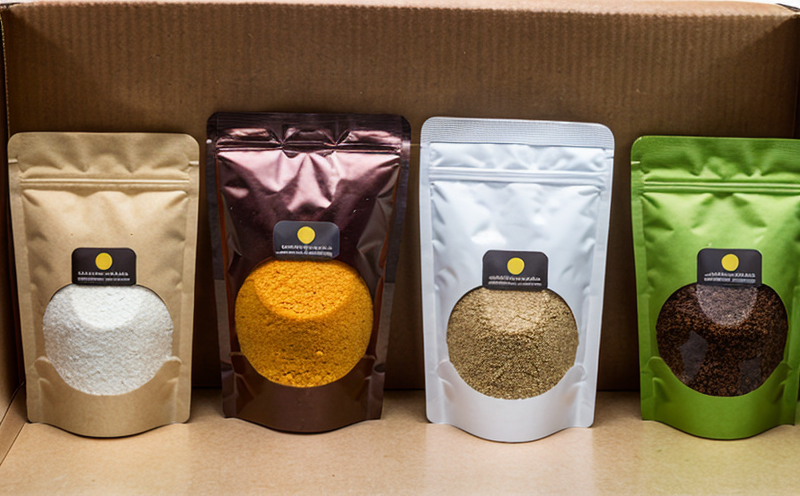Taste Transfer Testing in Food Contact Materials
Consumer Products & Product Safety Testing is a critical component of ensuring that products are safe and comply with regulatory standards. Within this sector, food contact materials (FCMs) represent an essential category since they come into direct or indirect contact with our food, affecting its safety, quality, and taste.
In the realm of FCMs, one key concern is taste transfer. This refers to the unintentional migration of chemicals from the packaging material into food. If not controlled properly, this can compromise both the flavor profile and healthiness of the final product. Taste transfer testing ensures that food contact materials do not impart an unacceptable taste or odor to foods.
The importance of taste transfer testing cannot be overstated. Regulatory agencies like the FDA in the United States, and the European Commission with its Food Contact Materials Regulation (EC) 10/2011, have stringent guidelines to ensure that food contact materials are safe for use. Compliance with these standards is essential, and taste transfer testing plays a crucial role in this compliance.
The process involves several steps: selecting the appropriate specimen, preparing it according to standard procedures, exposing it to simulated conditions (such as different types of food, temperature, pH levels), and then analyzing any transferred compounds. The goal is to ensure that no harmful or undesirable substances are present in the final product.
Our laboratory uses state-of-the-art equipment and methodologies to conduct taste transfer testing. Our experts follow international standards like ISO 21578:2019, ASTM D2641-13, and EN 12393 to ensure accuracy and reliability of results.
Given the complexity of taste transfer testing, it is essential that laboratories are equipped with experienced professionals who can interpret results correctly. Our team of experts ensures that every test adheres strictly to international standards and guidelines set forth by regulatory bodies like FDA, EU, and other relevant authorities.
The significance of this testing extends beyond just ensuring compliance; it also enhances consumer confidence in the products they purchase. By identifying potential issues early on through rigorous taste transfer tests, manufacturers can avoid costly recalls and maintain their brand reputation. Proper taste transfer testing helps prevent adverse health effects due to harmful substances migrating into food.
In summary, taste transfer testing is a vital aspect of ensuring that food contact materials are safe and do not compromise the quality or safety of our food products. It involves meticulous preparation and analysis to guarantee compliance with stringent regulatory requirements. At Eurolab, we provide comprehensive services tailored specifically towards this critical area, helping you meet all necessary standards while maintaining product integrity.
Industry Applications
- Packaging materials for beverages (e.g., plastic bottles, cans)
- Paper and cardboard packaging used in food processing industries
- Bakery products packaged in paper or foil containers
- Plastic wraps and films used in freezing foods
- Glass jars and bottles that store condiments and sauces
- Cellophane and other flexible plastics for wrapping candies and snacks
- Paperboard boxes for storing pastries and baked goods
- Resealable plastic containers for dairy products like yogurt or cottage cheese
These applications highlight the broad range of materials that need to undergo taste transfer testing. Each material type presents unique challenges, requiring careful attention during specimen preparation and exposure simulation.
Eurolab Advantages
At Eurolab, we pride ourselves on delivering world-class food contact materials testing services. Our advantages include:
- State-of-the-Art Facilities: Equipped with the latest technology and instruments for accurate taste transfer testing.
- Experienced Professionals: Our team comprises highly skilled scientists and engineers who are experts in this field.
- Comprehensive Services: We offer a full range of services from initial consultation to final report generation.
- Regulatory Compliance: Ensuring that all tests meet the highest regulatory standards worldwide.
- Real-Time Feedback: Clients receive detailed insights into their test results throughout the process.
- Custom Solutions: Tailored testing solutions for specific client needs and product types.
Our commitment to excellence ensures that you get reliable, accurate data every time. Whether your goal is compliance or quality improvement, Eurolab has the expertise and resources to help achieve it.
Use Cases and Application Examples
Taste transfer testing plays a pivotal role in various industries where food contact materials are used. Here are some real-world use cases:
- Beverage Industry: Testing of plastic bottles, cans, and caps to ensure they do not impart an undesirable taste or odor to beverages like soda, water, or juice.
- Bakery Products: Evaluating the integrity of paperboard boxes used for storing breads and pastries to prevent any flavor contamination from the packaging material.
- Dairy Sector: Assessing the compatibility of plastic wraps with dairy products such as cheese, yogurt, or butter to avoid unwanted taste transfer that could affect consumer satisfaction.
- Canned Foods: Ensuring that the metal cans used for food storage do not leach any harmful substances into the canned goods over time.
- Packaging of Condiments: Checking the suitability of glass or plastic containers for condiments like ketchup, mustard, and mayonnaise to guarantee flavor integrity during shelf life.
In each case, taste transfer testing helps maintain product quality, ensuring that consumers receive safe and enjoyable food products. This is especially important in industries where consumer trust and satisfaction are paramount.





